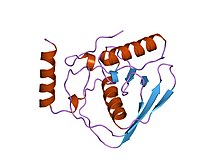Peptide déformylase
| N° EC | EC |
|---|---|
| Cofacteur(s) | [Fe2+] |
En enzymologie, une peptide déformylase (EC ) est une enzyme qui catalyse la réaction chimique suivante :
- formyl-L-méthionyl peptide + H2O formiate + méthionyl-peptide
Ainsi, les deux substrats de cette enzyme sont le formyl-L-méthionyl peptide et une molécule d'eau, tandis que ses deux produits sont le formiate et le peptide déformylé.
Cette enzyme est une métalloprotéase qui appartient à la famille des hydrolases, agissant sur les liaisons carbone-azote autres que les liaisons peptidiques, plus précisément dans les amides linéaires. Le nom systématique de cette classe d'enzymes est formyl-L-méthionyl-peptide amidohydrolase.
Études structurelles
En 2007, 34 structures avaient été élucidées pour cette classe d'enzymes (voir les numéros d'accession PDB) : 1IX1, 1LM4, 1LM6, 1LME, 1LQW, 1LQY, 1LRU, 1LRY, 1N5N, 1Q1Y, 1S17, 1SV2, 1SZZ, 1V3Y, 1VEV 1VEY, 1VEZ, 1WS0, 1WS1, 1XEM, 1XEN, 1XEO, 1Y6H, 1ZXZ, 1ZY0, 1ZY1, 2AI7, 2AI8, 2AI9, 2AIA, 2AIE, 2EW5, 2EW6 et 2EW7.
Références
- Adams JM, « On the release of the formyl group from nascent protein », J. Mol. Biol., vol. 33, no 3, , p. 571–89 (PMID 4973445, DOI 10.1016/0022-2836(68)90307-0)
- Mazel D, Pochet S et Marliere P, « Genetic characterization of polypeptide deformylase, a distinctive enzyme of eubacterial translation », EMBO J., vol. 13, no 4, , p. 914–23 (PMID 8112305, PMCID 394892, DOI 10.1002/j.1460-2075.1994.tb06335.x)
- Chan MK, Gong W, Rajagopalan PT, Hao B, Tsai CM, Pei D, « Crystal structure of the Escherichia coli peptide deformylase », Biochemistry, vol. 36, no 45, , p. 13904–9 (PMID 9374869, DOI 10.1021/bi9711543)
- Becker A, Schlichting I, Kabsch W, Schultz S, Wagner AF, « Structure of peptide deformylase and identification of the substrate binding site », J. Biol. Chem., vol. 273, no 19, , p. 11413–6 (PMID 9565550, DOI 10.1074/jbc.273.19.11413)
- Becker A, Schlichting I, Kabsch W, Groche D, Schultz S, Wagner AF, « Iron center, substrate recognition and mechanism of peptide deformylase », Nat. Struct. Biol., vol. 5, no 12, , p. 1053–8 (PMID 9846875, DOI 10.1038/4162)
- Rajagopalan PT, Yu XC, Pei D, « Peptide deformylase: a new type of mononuclear iron protein », J. Am. Chem. Soc., vol. 119, no 50, , p. 12418–12419 (DOI 10.1021/ja9734096)
- Groche D, Becker A, Schlichting I, Kabsch W, Schultz S, Wagner AF, « Isolation and crystallization of functionally competent Escherichia coli peptide deformylase forms containing either iron or nickel in the active site », Biochem. Biophys. Res. Commun., vol. 246, no 2, , p. 342–6 (PMID 9610360, DOI 10.1006/bbrc.1998.8616)
- Rajagopalan PT, Grimme S, Pei D, « Characterization of cobalt(II)-substituted peptide deformylase: function of the metal ion and the catalytic residue Glu-133 », Biochemistry, vol. 39, no 4, , p. 779–90 (PMID 10651644, DOI 10.1021/bi9919899)
- Hu YJ, Wei Y, Zhou Y, Rajagopalan PT, Pei D, « Determination of substrate specificity for peptide deformylase through the screening of a combinatorial peptide library », Biochemistry, vol. 38, no 2, , p. 643–50 (PMID 9888804, DOI 10.1021/bi9820412)
- Ragusa S, Mouchet P, Lazennec C, Dive V, Meinnel T, « Substrate recognition and selectivity of peptide deformylase Similarities and differences with metzincins and thermolysin », J. Mol. Biol., vol. 289, no 5, , p. 1445–57 (PMID 10373378, DOI 10.1006/jmbi.1999.2832)
- Giglione C, Pierre M, Meinnel T, « Peptide deformylase as a target for new generation, broad spectrum antimicrobial agents », Mol. Microbiol., vol. 36, no 6, , p. 1197–205 (PMID 10931273, DOI 10.1046/j.1365-2958.2000.01908.x)
- Pei D, « Peptide deformylase: a target for novel antibiotics? », Emerging Therapeutic Targets, vol. 5, no 1, , p. 23–40 (PMID 15992166, DOI 10.1517/14728222.5.1.23)



